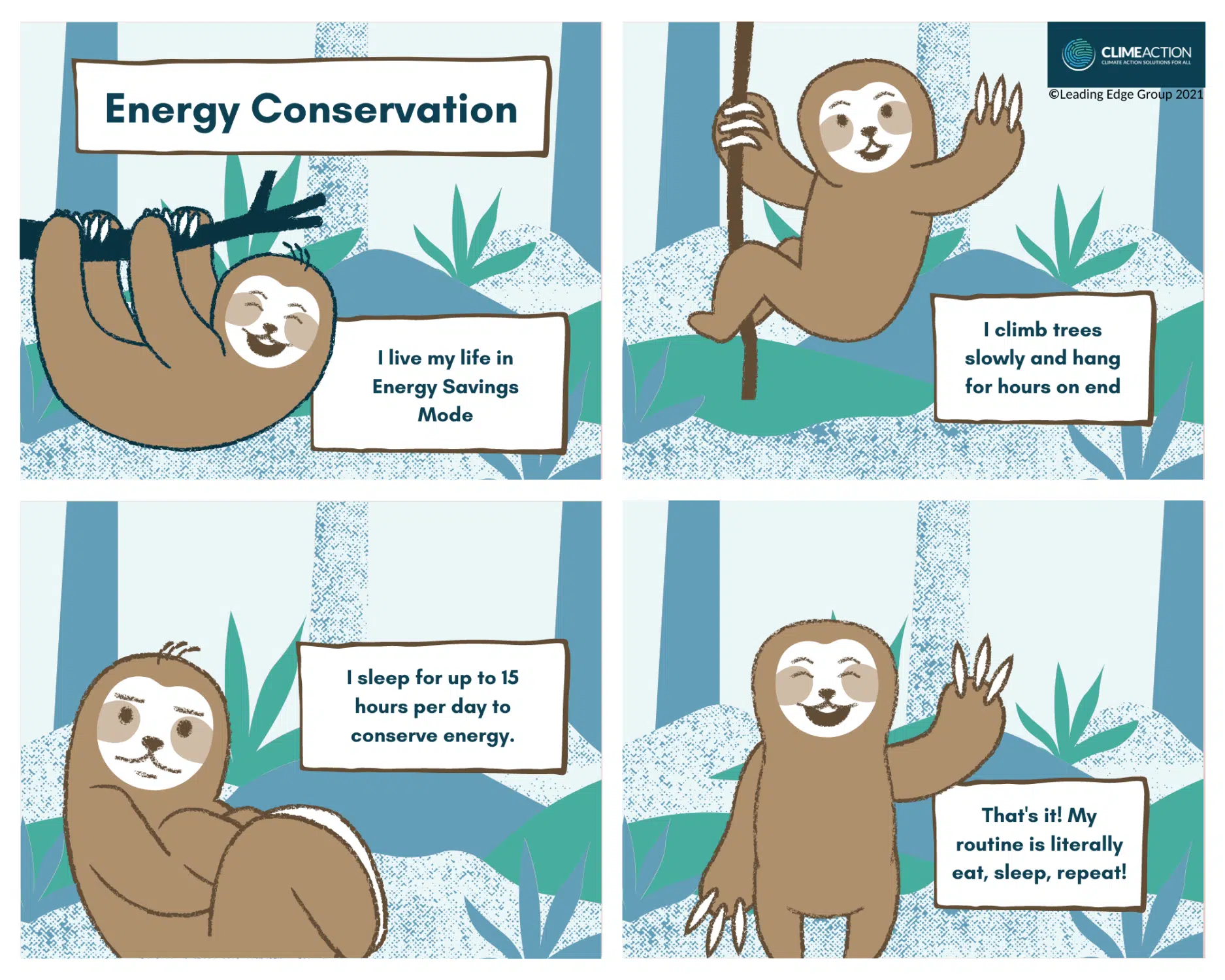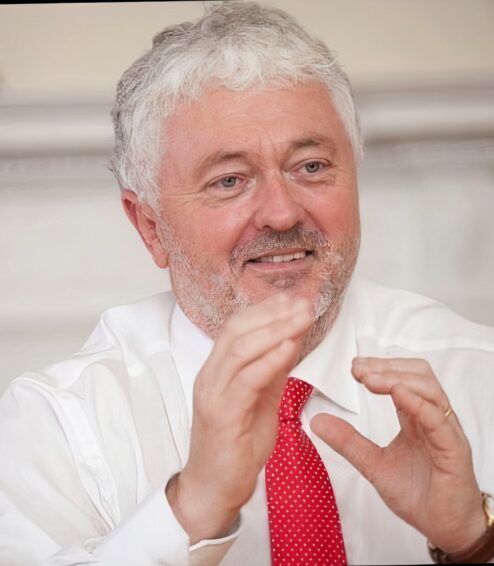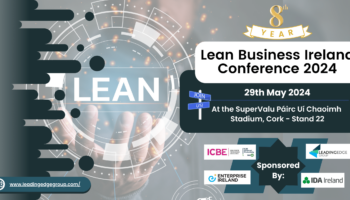Energy Conservation vs Energy Efficiency
So what is the difference between the above two terms? These two terms are often confused and there are many people with different opinions on their meaning but in simple terms what do they mean and why are the so important on our pathway to net zero?
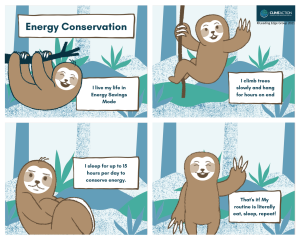
Energy Conservation is defined by the Collins dictionary as “the prevention of the wasteful use of energy, especially in order to ensure its continuing availability” .
Put simply it is a deliberate effort to use less energy or none at all – this can be through designing out the need for energy consumption, changing behaviours to reduce energy consumption or streamlining processes in business or our every day lives to reduce the amount of energy we use. Examples of these include:
- Designing out – Insulation so that we need to add less heat energy to maintain the same temperature in a building, a tank or a pipe for example.
- Designing out – Building a Passivehaus so that you may negate the need for a central heating system altogether.
- Changing behaviours – Switching off equipment when not in use.
- Streamlining Processes – Eliminating a heating step in a process after demonstrating there is no need after a chemical cleaning. Or at home washing your clothes at a low temperature.
Energy Efficiency is defined by the Collins dictionary as “a measure of how efficiently an appliance, building, organization or country uses energy”.
Put simply this is the using of less energy to perform the same task or function. It’s general equation is: Energy Output / Energy Input = Energy Efficiency
This is generally done through application of technology. Examples include:
- Condensing Boilers – these boilers are more efficient than non condensing boilers as they capture some of the heat that would otherwise have been lost in the flue gases. They may be up to 95% efficient.
- Heat Pumps – heat pumps use a refrigeration cycle to convert electrical energy into heat energy – they do this at efficiencies of between 150% to 700%.
- Hybrid Cars – Hybrid Cars have a higher efficiency than standard internal combustion engine cars as they use electric motors to supply some of the energy needed to move the vehicle – electric motors have inherently less losses.
- Combined Heat & Power systems – These are engines or turbines which are used to generate electricity but they recover heat to be used for other useful purposes which makes them more efficient than standard generators or power plants.
- LED lightbulbs – use less energy to produce as many lumens as their incandescent or CFL counterparts.
The trouble with a focus on Energy Efficiency alone is it can mislead people into making poor choices trying to do the right thing – for example if you were to attempt to be energy efficient through installing a heat pump at home without taking any Energy Conservation measures you may find you actually use more energy to do the same job- how could this be you say? Well its simple maths:
- Standard Condensing Boiler Efficiency – Heat Out / Fuel In = 95%
- Air Cooled Heat Pump Efficiency operating at 65 deg C – Approx 150% – low efficiency due to high temperatures required to do the same work as the standard condensing boiler with no energy conservation measures.
- Grid Efficiency – 58% approx – Source
- Heat Pump Energy Efficiency – Energy Output vs Energy Input – 87%
If Energy Conservation measures had been taken such as insulating the house, upgrading windows, doors, upgrading the heat transfer equipment such as radiators to increase surface area etc then the heat pump could operate at 35 deg C and potentially have an efficiency of 300% or more meaning this may be a good option. Now, the carbon story is different but we won’t get into that here.
Why are Energy Conservation & Energy Efficiency so important on our pathway to net zero?
Load shrinking – The IEA terms Energy Efficiency the first fuel. Globally, energy efficiency improved by an estimated 13% between 2000 and 2017. Without this improvement, global energy use in 2017 would have been 12% higher – equivalent to adding the annual final energy use of the European Union to the global energy market. Without these improvements our task to get to net zero may be more difficult as the rate of pace of installation of renewables may not keep pace with economic growth.
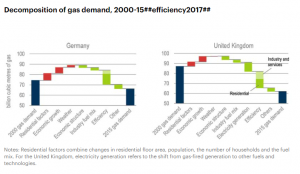
Energy Security – Energy Efficiency & Conservation have benefits for energy security also – By reducing overall energy demand, efficiency can reduce reliance on imports of oil, gas and coal. In the graphs above sourced from the IEA we can see the impact of efficiency on the gas demand in the UK & Germany compared with electricity generation changes.
Economics – Energy Conservation can be free in many cases and certainly can be low cost in the majority of cases. Energy Efficiency also generally pays for itself with typical paybacks between 1 – 5 years for many energy efficiency measures. These numbers are based on my own experience working in the area for years. This compares with c.8 – 10 years payback for renewable technologies in many business cases here in Ireland.
There are so many benefits to Energy Efficiency – you can find out more here.
In 2019 the IEA released their Energy Outlook report. In that report there was a graph that really caught my attention:
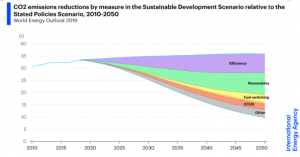
The graph above demonstrates where the emissions reductions need to come from to meet the IEA’s Sustainable Development Scenario. The IEA’s Sustainable Development Scenario (SDS) sets out a transformation of the global energy system, showing how the world can change its ways to deliver on the three main energy-related SDGs simultaneously. The SDS is aligned with the Paris agreement – The SDS keeps temperature rise to below 1.8 °C with a 66% probability without reliance on global net-negative CO2 emissions; this is equivalent to limiting the temperature rise to 1.65 °C with a 50% probability. More information here: IEA SDS
What is so striking about this graph is the contribution efficiency must play in this scenario and that this scenario goes nowhere near achieving net zero by 2050. Our current policies align with the top of the graph – although recent commitments from the USA & China will support an improvement on this trajectory. The world needs to start focusing on Energy Efficiency & Energy Conservation – there is no significant expense, the technology and know how is available and it offers a way to save money and reduce the overall requirement for more expensive measures such as renewable energy & alternative fuels. By not maximizing the benefits of Energy Efficiency & Conservation we are simply making decarbonization more difficult and expensive. Any good Climate Action Strategy will include these measures.
Climate Action Strategies – are the defined plan for meeting an organizations goal to reduce emissions and measurably reduce their impacts on Climate Change and support efforts to mitigate the effects of Climate Change.
At Climeaction we work with organizations of all scales to develop practical Climate Action Strategies.
Our strategies rely on Energy Conservation & Energy Efficiency as the first steps in any of those plans. Why? They make practical business sense and improve the payback of the strategy while reducing ongoing costs and insulate the organization against fuel costs increases. Our strategies take a full picture approach, reducing emissions, costs, building capacity & providing long term social & environmental sustainability impacts.
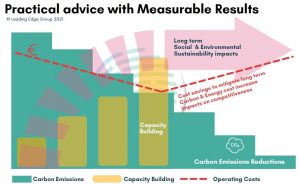
To learn more about how we can help your organization take Climate Action – Contact us.
